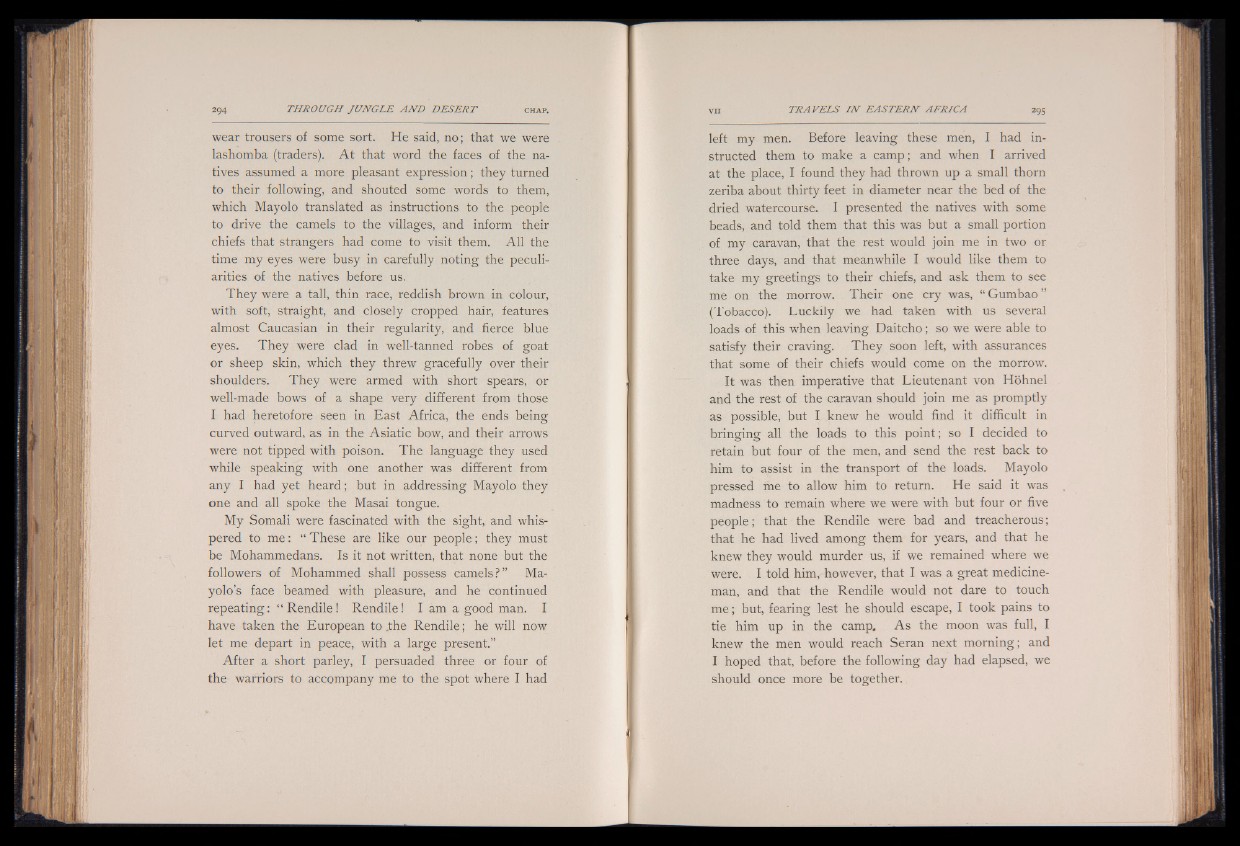
wear trousers of some sort. He said, no; that we were
lashomba (traders). A t that word the faces of the natives
assumed a more pleasant expression; they turned
to their following, and shouted some words to them,
which Mayolo translated as instructions to the people
to drive the camels to the villages, and inform their
chiefs that strangers had come to visit them. All the
time my eyes were busy in carefully noting the peculiarities
of the natives before us.
They were a tall, thin race, reddish brown in colour,
with soft, straight, and closely cropped hair, features
almost Caucasian in their regularity, and fierce blue
eyes. They were clad in well-tanned robes of goat
or sheep skin, which they threw gracefully over their
shoulders. They were armed with short spears, or
well-made bows of a shape very different from those
I had heretofore seen in East Africa, the ends being
curved outward, as in the Asiatic bow, and their arrows
were not tipped with poison. The language they used
while speaking with one another was different from
any I had yet heard; but in addressing Mayolo they
one and all spoke the Masai tongue.
My Somali were fascinated with the sight, and whispered
to me: “ These are like our people; they must
be Mohammedans. Is it not written, that none but the
followers of Mohammed shall possess camels?” Ma-
yolo’s face beamed with pleasure, and he continued
repeating: “ Rendile! Rendile! I am a good man. I
have taken the European to .the Rendile; he will now
let me depart in peace, with a large present.”
After a short parley, I persuaded three or four of
the warriors to accompany me to the spot where I had
left my men. Before leaving these men, I had instructed
them to make a camp; and when I arrived
at the place, I found they had thrown up a small thorn
zeriba about thirty feet in diameter near the bed of the
dried watercourse. I presented the natives with some
beads, and told them that this was but a small portion
of my caravan, that the rest would join me in two or
three days, and that meanwhile I would like them to
take my greetings to their chiefs, and ask them to see
me on the morrow. Their one cry was, “ Gumbao ”
(Tobacco). Luckily we had taken with us several
loads of this when leaving Daitcho; so we were able to
satisfy their craving. They soon left, with assurances
that some of their chiefs would come on the morrow.
It was then imperative that Lieutenant von Hohnel
and the rest of the caravan should join me as promptly
as possible, but I knew he would find it difficult in
bringing all the loads to this point; so I decided to
retain but four of the men, and send the rest back to
him to assist in the transport of the loads. Mayolo
pressed me to allow him to return. He said it was
madness to remain where we were with but four or five
people; that the Rendile were bad and treacherous;
that he had lived among them for years, and that he
knew they would murder us, if we remained where we
were. I told him, however, that I was a great medicineman,
and that the Rendile would not dare to touch
me; but, fearing lest he should escape, I took pains to
tie him up in the camp. As the moon was full, I
knew the men would reach Seran next morning; and
I hoped that, before the following day had elapsed, we
should once more be together.